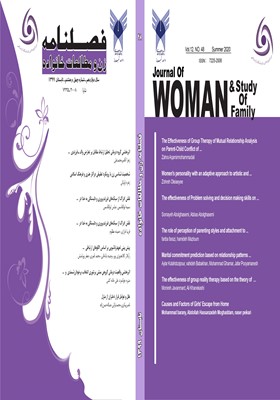اثربخشی گروه درمانی تحلیل ارتباط متقابل بر تعارض والد ـ فرزندی مادران با طرحواره ناسازگار طرد و بریدگی
محورهای موضوعی : زن و خانواده
1 - مربی ، گروه روانشناسی بالینی، واحد قم ، دانشگاه آزاد اسلامی ، قم، ایران. ( نویسنده مسئول )
کلید واژه: تعارض, ارتباط متقابل, طرحواره, والد- فرزندی,
چکیده مقاله :
پژوهش حاضر با هدف بررسی اثربخشی گروه درمانی تحلیل ارتباط متقابل بر تعارض والد ـ فرزندی مادران با طرحواره ناسازگار طرد و بریدگی انجام شد. روش پژوهش نیمهآزمایشی با طرح پیشآزمون – پسآزمون و گروه کنترل بود. جامعه آماری پژوهش شامل 70 نفر از مادران مراجعه کننده به مراکز مشاوره و خدمات روانشناختی شهر قم (به علت داشتنن روابط نامناسب با فرزندانشان) در بهار 1397 بودند. تعداد 30 نفر از آنها با توجه به تشخیص داشتن طرحواره ناسازگار طرد و بریدگی و نمونهگیری هدفمند (ملاک های ورود و خروج)، انتخاب و بهصورت تصادفی در دو گروه آزمایش (15 نفر) و کنترل (15 نفر) گمارده شدند. گروه درمانی مبتنی بر تحلیل ارتباط متقابل به مدت 10 جلسه 90 دقیقهای (هر هفته 2 جلسه) بر روی گروه آمایش اجرا شد؛ گروه کنترل به مدت دو ماه در لیست انتظار قرار گرفت. بهمنظور جمع-آوری اطلاعات از مقیاس رابطه والد- فرزندی استفاده شد. دادهها با استفاده از آزمون تحلیل کوواریانس چندمتغیره، تحلیل شد. نتایج نشان داد با کنترل اثر پیش آزمون، بین میانگین نمرات پس آزمون گروههای آزمایش و گروه کنترل در مؤلفههای رابطه والد – فرزندی شامل؛ تعارض، نزدیکی، وابستگی و رابطهی مثبت کلی، تفاوت معناداری وجود دارد. بهعبارتی دیگر، گروه درمانی تحلیل ارتباط متقابل بر افزایش نزدیکی و رابطه مثبت کلی و کاهش تعارض و وابستگی رابطه والد- فرزندی اثربخش است. در مجموع، میتوان نتیجه گرفت که گروه درمانی تحلیل ارتباط متقابل میتواند به عنوان مداخلهای مؤثر، رابطه والد- فرزندی را در مادرانی که دارای طرحواره ناسازگار اولیه هستند، بهبود بخشد.
The aim of this study was to investigate the effectiveness of group therapy of cross-sectional analysis on parent-child conflict between mothers with incompatible rejection and exclusion schemas. The research method was quasi-experimental with pretest-posttest design and control group. The statistical population of the study included 70 mothers who referred to counseling centers and psychological services in Qom (due to having inappropriate relationships with their children) in the spring of 2018. Thirty of them were selected and randomly assigned to experimental (n = 15) and control (n = 15) groups according to the diagnosis of incompatible rejection and cut-off scheme and purposeful sampling (inclusion and exit criteria). . Group therapy based on interaction analysis was performed on the Experimental group for 10 sessions of 90 minutes (2 sessions per week); The control group was placed on a waiting list for two months. The parent-child relationship scale was used to collect information. Data were analyzed using multivariate analysis of covariance. The results showed that by controlling the effect of pre- There was a significant difference, between the mean post-test scores of the experimental group and the control group in the components of the parent-child relationship, including; conflict, closeness, dependence and overall positive relationship. In other words, group therapy is effective in increasing the closeness and overall positive relationship and reducing the conflict and dependence of the parent-child relationship. Overall, it can be concluded that group interaction analysis therapy can improve the parent-child relationship in mothers with early maladaptive schemas as an effective intervention.


